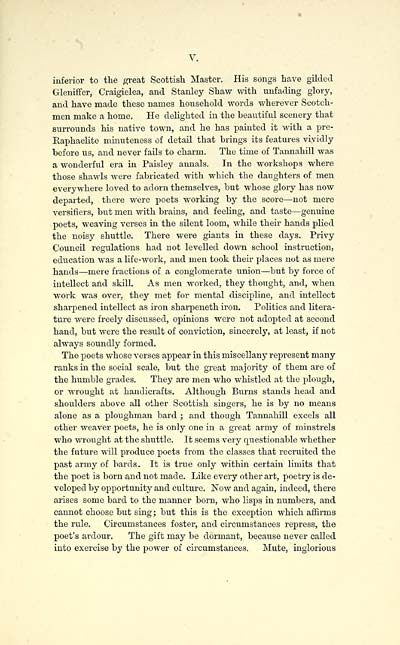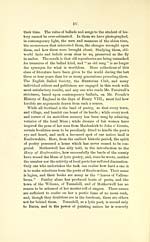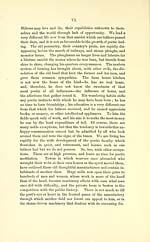Glen Collection of printed music > Printed text > Harp of Renfrewshire
(15) Page v
Download files
Complete book:
Individual page:
Thumbnail gallery: Grid view | List view

inferior to the ^eat Scottish Master. His songs have gilded
Gleniffer, Craigielea, and Stanley Shaw with unfading glory,
and have made these names household words wherever Scotch-
men make a home. He delighted in the beautiful scenery that
surrounds his native town, and he has painted it with a pre-
Raphaelite minuteness of detail that brings its features vividly
before us, and never fails to charm. The time of Tannahill was
a wonderful era in Paisley annals. In the workshops where
those shawls were fabricated with which the daughters of men
everywhere loved to adorn themselves, but whose glory has now
departed, there were poets working by the score — not mere
versifiers, but men with brains, and feeling, and taste — genuine
poets, weaving verses in the silent loom, while their hands plied
the noisy shuttle. There were giants in these days. Privy
Council regulations had not levelled down school instruction,
education was a life-work, and men took their places not as mere
hands — mere fractious of a conglomerate union — but by force of
intellect and skill. As men worked, they thought, and, when
work was over, they met for mental discipline, and intellect
sharpened intellect as iron sharpeneth iron. Politics and litera-
ture were freely discussed, opinions were not adopted at second
hand, but were the result of conviction, sincerely, at least, if not
always soundly formed.
The poets whose verses appear in this miscellany represent many
ranks in the social scale, but the great majority of them are of
the humble grades. They are men who whistled at the plough,
or wrought at handicrafts. Although Burns stands head and
shoulders above all other Scottish singers, he is by no means
alone as a ploughman bard ; and though Tannahill excels all
other weaver poets, he is only one in a great army of minstrels
who wrought at the shuttle. It seems very questionable whether
the future will produce poets from the classes that recruited the
past army of bards. It is true only within certain limits that
the poet is born and not made. Like every other art, poetry is de-
veloped by opportunity and culture. Now and again, indeed, there
arises some bard to the manner born, who lisps in numbers, and
cannot choose but sing ; but this is the exception which affirms
the rule. Circumstances foster, and circumstances repress, the
poet's ardour. The gift may be dormant, because never called
into exercise by the power of circumstances. Mute, inglorious
Gleniffer, Craigielea, and Stanley Shaw with unfading glory,
and have made these names household words wherever Scotch-
men make a home. He delighted in the beautiful scenery that
surrounds his native town, and he has painted it with a pre-
Raphaelite minuteness of detail that brings its features vividly
before us, and never fails to charm. The time of Tannahill was
a wonderful era in Paisley annals. In the workshops where
those shawls were fabricated with which the daughters of men
everywhere loved to adorn themselves, but whose glory has now
departed, there were poets working by the score — not mere
versifiers, but men with brains, and feeling, and taste — genuine
poets, weaving verses in the silent loom, while their hands plied
the noisy shuttle. There were giants in these days. Privy
Council regulations had not levelled down school instruction,
education was a life-work, and men took their places not as mere
hands — mere fractious of a conglomerate union — but by force of
intellect and skill. As men worked, they thought, and, when
work was over, they met for mental discipline, and intellect
sharpened intellect as iron sharpeneth iron. Politics and litera-
ture were freely discussed, opinions were not adopted at second
hand, but were the result of conviction, sincerely, at least, if not
always soundly formed.
The poets whose verses appear in this miscellany represent many
ranks in the social scale, but the great majority of them are of
the humble grades. They are men who whistled at the plough,
or wrought at handicrafts. Although Burns stands head and
shoulders above all other Scottish singers, he is by no means
alone as a ploughman bard ; and though Tannahill excels all
other weaver poets, he is only one in a great army of minstrels
who wrought at the shuttle. It seems very questionable whether
the future will produce poets from the classes that recruited the
past army of bards. It is true only within certain limits that
the poet is born and not made. Like every other art, poetry is de-
veloped by opportunity and culture. Now and again, indeed, there
arises some bard to the manner born, who lisps in numbers, and
cannot choose but sing ; but this is the exception which affirms
the rule. Circumstances foster, and circumstances repress, the
poet's ardour. The gift may be dormant, because never called
into exercise by the power of circumstances. Mute, inglorious
Set display mode to: Large image | Transcription
Images and transcriptions on this page, including medium image downloads, may be used under the Creative Commons Attribution 4.0 International Licence unless otherwise stated. ![]()
| Special collections of printed music > Glen Collection of printed music > Printed text > Harp of Renfrewshire > (15) Page v |
|---|
| Permanent URL | https://digital.nls.uk/90392735 |
|---|
| Description | Scottish songs and music of the 18th and early 19th centuries, including music for the Highland bagpipe. These are selected items from the collection of John Glen (1833 to 1904). Also includes a few manuscripts, some treatises, and other books on the subject. |
|---|
| Description | The Glen Collection and the Inglis Collection represent mainly 18th and 19th century Scottish music, including Scottish songs. The collections of Berlioz and Verdi collected by bibliographer Cecil Hopkinson contain contemporary and later editions of the works of the two composers Berlioz and Verdi. |
|---|

